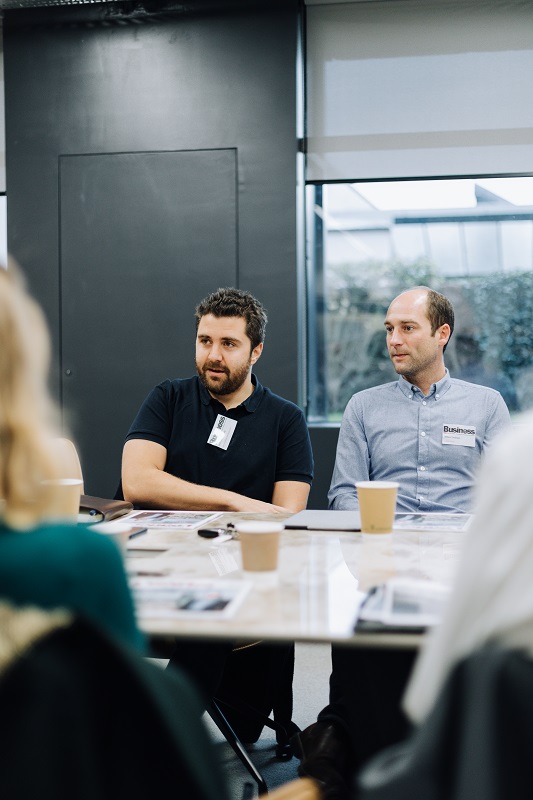Energy & Critical Metals
Why tackling the climate crisis will be a mix of political will and business action
In our most recent roundtable event, we teamed up with Coreus Group to host a debate about tackling the climate crisis and dug deeper into how companies…

In our most recent roundtable event, we teamed up with Coreus Group to host a debate about tackling the climate crisis and dug deeper into how companies feel about sustainability.
Tackling the climate crises can often seem like an otherworldly task when it is placed amidst the context of global demands, bickering politicians and overwhelming international conferences. There is lethargy too around the subject, as business leaders battle rising costs and ‘today’ challenges and with Brazil, India, Russia, China, and the USA often not pulling their weight, you can forgive leaders that place sustainability plans at the bottom of their to-do lists.
But as Mahatma Gandhi said, ‘be the change you want to see in the world’, and many UK businesses are taking great strides when it comes to their net zero carbon agendas. Also, the reality is that not only is it the right thing to do, the employees, funders and customers of the future will start to walk away from businesses that talk a good game but don’t deliver.
What is happening behind the marketing slogans and nice words, and what can other scaling businesses learn?
One of the companies taking part in the debate was accountancy firm, Albert Goodman. On how they are taking steps to become net zero, Sophie Parkhouse who is a Partner at the firm, comments: “We have made a commitment to be net zero by 2030 and we’re looking at scope one and scope two emissions, as these are the ones that our most within our control.
“We’re looking at installing electric charge points for vehicles, encouraging cycle rates and we’re also looking at installing solar panels for our roofs. We also have a policy where unless a meeting isn’t going to benefit the firm or the client, we’re having virtual meetings.”
Housebuilding property

Ed Khodabandehloo (L)
Ed Khodabandehloo is the Managing Director at Summerfield Developments, and he says that the sector is heading in a direction to be net zero carbon by 2030.
“Rightly, the sector is committed to being zero carbon and funders, stakeholders and housing associations are pushing us in this direction too,” he comments. “They want to see you hit certain criteria with the product you deliver.
“It does add cost pressures though, in certain locations. This is because you will get a premium for delivering a net zero carbon house in a location that is considered desirable, whereas the pressure comes when you must deliver net zero homes in less desired locations. You put those houses on the sales market at a cost. It’s a scenario where those who need these homes most, can’t access them.”
Khodabandehloo also says that many lenders are giving better rates of interest if you can show real sustainable outcomes.
Unlike the residential sector, delivering sustainable space in the commercial sector is much easier as employers are willing to pay a premium says Will Tomlinson, who is Development Director at Cubex Land.
He says: “It is easier to bring in sustainable technology and deliver sustainable projects in the commercial property sector. Businesses are happy to pay headline rents, as their employees want to be in sustainable buildings.”
Can businesses afford to be sustainable?
For many leaders, becoming more sustainable can appear to add additional cost, but Jonathan Davis, Managing Director at Powerhaus UK believes that doing the right thing can save money.
He explains: “It’s about culture and mindset first and it is something businesses will need to do if they want to stay on the right side of their customers. Yes, it is still price and service and all of that first, but people are going to want to buy from, and do business with, companies that have the right values too.
“Businesses can afford to be more sustainable, and the argument is strong to say they can’t afford not to be. Do they need more help? There is a limit to the help that can be given but perhaps there should be more rewards for the companies that do the good stuff.”
Davis also says that businesses shouldn’t be worried about investing in technology and sustainable goods and it being defunct due to the pace of change: “The sector isn’t that fast-moving. When you look at solar, heat pumps and the like, there isn’t going to be transformational change. Many businesses have a mindset of just getting through the next five years due to rising costs but doing the right thing will reduce costs in the long run.”
One business that has proved just this is Ignition DG Ltd, an events and exhibition specialist. It is ahead of the game when it comes to being more sustainable.

Samantha Rowe
Its CEO, Samantha Rowe explains more: “We started our sustainability journey sixteen years ago and we’re already carbon neutral for scope one and scope two and we’re now focusing on scope three. We are B Corp certified too. The biggest challenge we’re facing is around scope three, as it is very unclear what needs to be done. There isn’t one place you can go to find out.
“For us though, as a business, it’s also about who we work with and connecting with suppliers that are sustainable.”
Rowe says the business is international too and has turned down work in countries that aren’t taking the issue seriously: “We have turned away lucrative business in places like the Middle East, which hasn’t always been great for our bottom line, but it is the right thing to do. In fact, we’ve won contracts at a premium because of our sustainability focus, so it is paying to keep true.”
What about the automotive sector?

Richard Robertson, Managing Director at Clarus MotorPark (L)
With diesel cars being punished, the advent of brands like Tesla and clean air zones popping up in cities across the UK, the humble ‘car’ holds one of the keys to tackling climate change, but an experienced businessman in the sector believes there is still a long way to go.
Richard Robertson, Managing Director at Clarus MotorPark, comments: “It is an antiquated industry and there is a challenge because, as more electrical and hybrid vehicles hit the market, the coverage doesn’t hit the demand, so it is not functioning well enough yet.
“The industry will get there, but there are too many people in the market who want to have electric vehicles but aren’t able to afford them due to their cost point.”
An interesting business operating in the automotive space is Lightfoot. Samantha Preen, who is Head of Risk and Compliance, explains that the company have developed a technology product that delivers real-time information to drivers of fleet vehicles about how they are driving. She says the product influences driver behaviour and can save consumers and businesses on fuel and also reduce carbon emissions.
She says: “We’ll get to a point where you’ll only need to charge your electric vehicle once a month, but before that our product is one of the solutions that can help drivers reduce their carbon emissions. You get feedback in real-time about how you are driving. If you are driving badly, you get prompts and after three prompts, you get a penalty. It’s all about gamification as you are ranked, and you can achieve elite status as a driver and win cars. We like to call it the Fitbit for cars or even the Strava for drivers.”
Who is going to pay for a more sustainable world?

Dr Stuart Robinson, Exeter University (centre)
Businesses in the UK are clearly doing their bit and being innovative in a challenging environment, but there needs to be political will too, to really drive substantial change.
Dr Stuart Robinson works at Exeter University and has been working on sustainable initiatives and policy for many years. He believes that affordability and universality are two key issues that need to be addressed.
“How do we deal with a situation where a part of society can afford to be more sustainable but larger parts can’t?” says Robinson. “You can build a net zero house in one location but not in another, but it needs to be in that other place because that house is still emitting.
“It was discussed at COP 27 about transfers and who is going to pay for us to be more sustainable. If we accept that something must be done then we should all pay for it, and this will mean policy changes from the government, otherwise, we’ll have a crisis that will get bigger.”
Robinson says his team have been looking at electrification in the UK and to hit 2050 net zero targets, the UK needs to double its generating capacity and the cost of this is huge and requires political solutions running alongside businesses all doing their bit.
Ed Khodabandehloo agrees with Robinson: “We can all do our bit as business owners – we can offer bigger car allowances for electric cars, but there have to be fundamental changes driven by government. This could be in the shape of tax breaks for consumers and business owners that actually tackle climate change.”
The post Why tackling the climate crisis will be a mix of political will and business action appeared first on Business Leader.

Uranium Exploration Company Announces Additional Staking in the Athabasca Basin
Source: Streetwise Reports 12/22/2023
Skyharbour Resources Ltd. announced an update from its Canada-based Falcon Project along with additional…
Tesla Launches New Mega Factory Project In Shanghai, Designed To Manufacture 10,000 Megapacks Per Year
Tesla Launches New Mega Factory Project In Shanghai, Designed To Manufacture 10,000 Megapacks Per Year
Tesla has launched a new mega factory…
Giving thanks and taking stock after “a remarkable year”
An end-of-year thank you to our readers, industry colleagues and advertisers before Electric Autonomy breaks from publishing until Jan. 2
The post Giving…


















